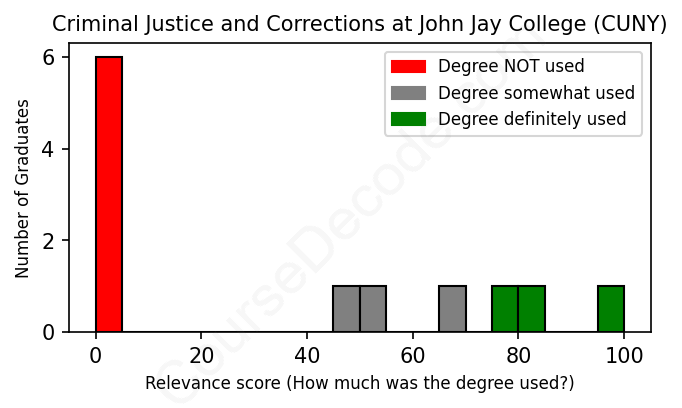
First, some facts. Of the Criminal Justice and Corrections graduates from John Jay College (CUNY) we've analyzed , here's how many have used (or NOT used) their degree in their career:

These are estimates based on AI analysis of 12 LinkedIn profiles (see below).
The verdict? Horrible! Overall, with an average relevance score of 35%, Criminal Justice and Corrections graduates from John Jay College (CUNY) have an exceptionally lower likelihood (-32%) of finding work in this field compared to the average graduate across all fields:
And for comparison, here's the chart for all profiles we've looked at across all degrees.
Also, after graduating, only 33% of these graduates have pursued further education other than another Bachelor's degree (such as a Masters degree or other), compared to the average across all profiles of 35%. This suggests a Bachelors degree is enough for most Criminal Justice and Corrections graduates, and it's normal to look for work straight after graduation.
See the details:
|
Relevance score: 0% We think this person has NOT gone into a career related to their degree. We think this person has NOT gone into a career related to their degree.
DEGREE INFOGraduated in 2023 from John Jay College (CUNY) with a Bachelor's degree in Criminal Justice and Corrections. No other secondary education since. JOB HISTORY SINCE GRADUATIONSupport Representative Amalgamated Bank Jun 2023 - Present ABOUTI am currently in my senior year at John Jay College of Criminal Justice looking to settle for a long term job. I currently work two jobs. One is as a Financial Service Associate at New York Community Bank. I also work at a Smoke shop on the weekends to make extra cash on the side. Along with this, I juggle a 3.4 GPA as a full time student. References are available upon request. |
The top 10 most common jobs done by the graduates we've analyzed (ranked most common to least) are:
When looking at the types of jobs that people with a Criminal Justice and Corrections degree from John Jay College have pursued, it’s clear that they have branched out into a variety of fields. Many graduates have found themselves in roles like financial analysts, accountants, or even video editors, which really don’t have much to do with criminal justice principles. In fact, a lot of the positions listed—such as operations manager, receptionists, and sales associates—are quite removed from the core competencies of their degrees, focusing instead on general management, customer service, or administrative tasks.
On the other hand, there are some noteworthy exceptions. A good chunk of graduates have landed roles that are directly relevant to criminal justice, like juvenile officers, child protective specialists, and reentry specialists, which clearly utilize their education. However, it seems that many have opted for jobs where the connection to their degree is pretty loose, opting for career paths in areas like finance or general support services. So, while there are definitely graduates making a significant impact in the criminal justice field, a surprisingly large number have taken on roles that don’t really tap into what they studied.
Here is a visual representation of the most common words in job titles for Criminal Justice and Corrections graduates (this is across all Criminal Justice and Corrections graduates we've analyzed, not just those who went to John Jay College (CUNY)):

From the looks of it, graduates of the Criminal Justice and Corrections program at John Jay College have some pretty varied career paths. When they first graduate, many seem to land jobs that are somewhat related to criminal justice, like case management, support roles, or pretrial services. However, there are also quite a few who end up in roles that are a bit of a stretch from what they studied, like sales or video editing. This trend suggests that while some graduates make direct connections with their degree in the criminal justice field, others might not find that immediate relevance, leading to careers that don't align directly with their education.
As for their career trajectories over the years, after about five years, many of these graduates are still involved in roles related to social services, direct support, or various positions in the justice system; others, however, have shifted entirely away from criminal justice. For those who continue in the field, they often advance into more specialized or managerial positions, such as program coordination or management roles. On the flip side, some graduates have taken quite different paths and found success in unrelated fields, which could indicate that the degree provides transferable skills but may not guarantee immediate employment in criminal justice roles. Overall, while there are success stories, there seems to be a healthy mix of outcomes, with some graduates thriving in relevant careers, while others venture into diverse professional landscapes that may not reflect their studies directly.
Getting a Bachelor’s degree in Criminal Justice and Corrections at John Jay College (or really any school) can be a mixed bag in terms of difficulty. It’s definitely not a walk in the park, but I wouldn't say it’s the hardest thing ever, either. A lot of it comes down to your interest in the subject and your study habits. If you’re passionate about topics like law enforcement, the legal system, and social justice, you might find the coursework engaging and manageable. There are definitely challenging classes—especially in the research and theory parts—but overall, many students find that with a bit of time management and motivation, they can handle it just fine.
Most commonly, in the LinkedIn profiles we've looked at, it takes people 5 years to finish a Bachelor degree in Criminal Justice and Corrections.
So, looking at the job paths of these John Jay graduates, it seems like they’ve had a bit of a mixed bag when it comes to making decent money. Some, like the Operations Manager and Financial Analyst, probably have solid salaries since those roles typically pay well, especially in larger companies. Others, especially in social services like the Case Manager or Youth Development Specialist positions, might be on the lower end of the pay scale, as those jobs often don’t pay as much as you’d hope. Overall, while some graduates are likely doing pretty well financially, others might be just getting by. It's a reminder that not all degrees lead to high-paying jobs, but they’re definitely making a difference in their fields!
Here is a visual representation of the most common words seen in the "about" section of LinkedIn profiles who have a Bachelor degree in Criminal Justice and Corrections (this is across all Criminal Justice and Corrections graduates we've analyzed, not just those who went to John Jay College (CUNY)). This may or may not be useful:

Here are all colleges offering a Bachelor degree in Criminal Justice and Corrections (ordered by the average relevance score of their Criminal Justice and Corrections graduates, best to worst) where we have analyzed at least 10 of their graduates:
| College | Score | Count |
|---|---|---|
 American Military University American Military University
|
52 | 13 |
 Bridgewater State University Bridgewater State University
|
50 | 13 |
 University of Central Florida University of Central Florida
|
47 | 14 |
 University of North Texas University of North Texas
|
47 | 14 |
 University of Phoenix University of Phoenix
|
41 | 23 |
 University of Cincinnati University of Cincinnati
|
41 | 12 |
 Sam Houston State University Sam Houston State University
|
35 | 22 |
 John Jay College (CUNY) John Jay College (CUNY)
|
35 | 12 |
 Ferris State University Ferris State University
|
34 | 14 |
 Florida International University Florida International University
|
31 | 17 |
 Liberty University Liberty University
|
31 | 10 |
 California State University-Sacramento California State University-Sacramento
|
24 | 14 |
 Colorado Technical University Colorado Technical University
|
24 | 16 |